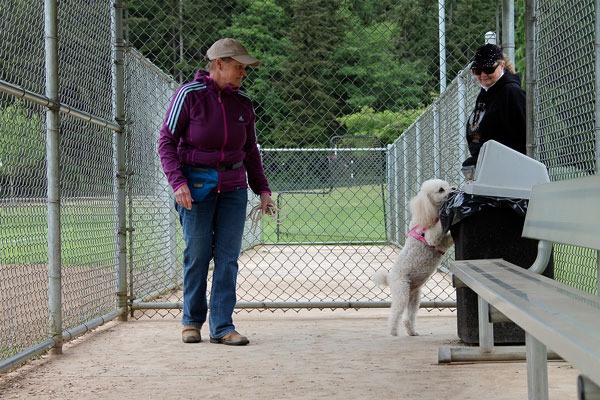Clinton resident Dale Kerslake and her timid 4-year-old poodle, Keiko, anxiously step up to the starting line as they await the signal to search. Keiko makes no attempt to interact with people nearby, instead cowering by Kerslake’s leg. But when the signal is given, Keiko suddenly leaps into action to lead her owner through the course, confidently sniffing her way through every nook and cranny.
The game is nose work, a fast-growing dog sport that teaches owners to develop their canine’s natural scenting ability. Individual pups are tasked with sniffing out scents left in designated areas by a nose work instructor, with owners often unaware of the scents’ locations at the higher skill levels.
“It’s just what dogs like to do: sniffing around,” Kerslake said. “So when they find something and are rewarded for it, they get so happy.”
The South Whidbey Parks and Recreation District is offering nose work classes directed by Certified Nose Work Instructor Georgia Edwards for owners and dogs of all abilities. A number of classes cater to advanced pooches, but beginner classes are offered for first timers. The current crop of classes ends June 8, but another set of summer classes is to be announced by the South Whidbey Parks and Recreation District in the future. Registration is $150 per dog for six sessions.
Edwards is a retired cancer physician who became interested in canine scent discrimination from analyzing therapy dogs that would sit with patients going through chemotherapy. She noticed that one of her dogs could sense a form of breast cancer developing in a patient; it could smell the breakdown of cancerous cells. It spurred an interest in dogs’ olfactory abilities, and pushed her to become a certified instructor.
In a sense, nose work trains the owner as much as the dog, Edwards said. It requires the owner to build an understanding of the signals the pup gives when it has located a scent. It’s a sport that builds a bond between human and pooch, and can have therapeutic results for disabled and emotionally scarred dogs such as Keiko.
“It’s a sport you can do for the entire lifespan of a dog and allows for those who are handicapped,” Edwards said. “You can’t compete in anything if you have a blind or deaf dog, but this sport allows all dogs to participate, even emotionally challenged ones.”

Keiko, like many other nose work dogs, is a rescue who at one point would cower at the sight of humans after years of abuse. Edwards says about half of the dogs that come to her nose work classes are rescues who come with a particular problem such as inactivity, abuse or a physical disability, but often leave as happier pooches.
“It’s rewarding for the dogs to do this and they tend to be more comfortable in their environment as a result,” Edwards said. “Dogs need a job, so when they come to these classes and are given one, they learn to be more self controlled. They become more confident and it often changes their lives.”
While not serving as a direct pipeline to service and rescue positions, the dogs often put their nose work skills to good use in other lines of work. Some of the canines in Edwards’ classes are also truffle dogs, service dogs, and have titles in other sports such as agility and “crittering” (game chasing).
Scent skills can also be transferrable to a plethora of other jobs, such as search and rescue, rare animal tracking and bear deterrents. The only industries that don’t allow nose work pooches are those within law enforcement, since dogs that sniff out narcotics and explosives are only allowed to detect one scent in a court of law.
Don Mason, an Island County senior search dog handler, emphasized that while nose work isn’t a feeder program to jobs such as search and rescue, the process of training the dogs isn’t much different. It comes down to giving dogs a role within the pack, and domestic dogs aren’t removed from that natural instinct, he said.
“It’s fair to say that dogs, being pack animals, often work best and are most socially happy and most fulfilled when they have a clear-cut job,” Mason said. “I think it’s vital to have a trainer like Georgia in our community because it is such a resource on so many levels for different industries.”
Kerslake and Keiko can vouch for the positive impact nose work can have on a pooch’s happiness. When Kerslake first brought Keiko home, her tail was tucked between her legs, she ran straight under the table and refused contact with humans. Now, although she is still timid, her tail wags when tasked with sniffing out hidden scents.
“She’s completely different from when we first brought her home,” Kerslake said. “We were suggested to enroll her in nose work classes to boost her confidence, and we’ve never looked back.”


